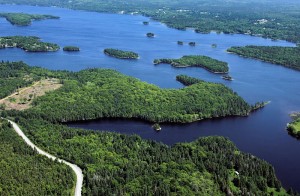When land in Nova Scotia has no known owner, the property in question is listed as “owner unknown” within the Province’s land registration database. But what does this mean?
When land in Nova Scotia has no known owner, the property in question is listed as “owner unknown” within the Province’s land registration database. Essentially, this means that the authorities have no ownership papers (deeds, wills or other official documents) at their disposal. But what becomes of those unclaimed acres? Private Island News decided to take a closer look.
Contrary to popular belief, the land does not automatically revert to provincial ownership. As in the case of the six Cape Breton islands featured in Private Island News earlier this week, if a municipality is interested in selling or even appropriating an owner unknown piece of land, they must first complete an eighteen-month “vesting period.”
Eighteen Months to Stake a Claim
This vesting period begins with an initial publication period, in which the municipal authorities are obliged to reach out to the public (usually by means of newspaper advertisements and a search of historic land records) in order to establish who the true owner is and to give other residents sufficient time and notice to stake a claim (for example, an adverse possession claim).
If no-one registers a claim within this 18-month time period, the land is then allowed to be placed up for sale and the Province – via the Department of Natural Resources (DNR) – is given the first right of refusal to acquire the property from the municipality and to ultimately make it Crown-owned land.
At this point, the Province of Nova Scotia is required to pay back any outstanding taxes and charges owed to the municipality, bringing the land back into the municipality’s active tax rolls. These are typically minimal, as the owner-unknown lands tend to be resource land and therefore have low assessment values.
The properties in question are then evaluated for any kind of management or stewardship potential. In the case of islands, however – which offer a (relative) lack of land predators and human disturbance – the land is usually set aside for protection and re-appropriated as valuable wildlife habitat – often with the assistance of conservation groups, such as Ducks Unlimited.
How Does Land Become “Owner Unknown”?
Yet just how does a property become “owner unknown”? The reasons are rooted in Nova Scotia’s history, as Jody Nelson of the province’s Natural Resources Department explained. “Sometimes lands were granted 200 – 250 years ago. Back then, there were certain conditions that had to be met for the grant to be realized.”
“If you were granted lands and never did anything with them, never occupied them, never farmed them, never raised cattle on them – things like that – then after a certain amount of time, they would revert back to the Crown,” stated Nelson, in a recent interview with Canada’s The Chronicle Herald.
“Yet more often than not, these lands were never granted and now they’re just sitting there,” he continued. “Particularly in the case of islands, a lot of them never made their way back to us.”
Read more:
- Nova Scotian Conservation Group Adds New Island to Protected Area (April 2015)
http://www.privateislandnews.com/canada-nova-scotian-conservation-group-adds-new-island-to-protected-area/ - Nova Scotia’s Biggest Private Island Bought by Nature Trust (October 2013)
http://www.privateislandnews.com/canada-nova-scotias-biggest-private-island-bought-by-nature-trust/ - Canadian Conservancy Group Successfully Acquires Bella Island (December 2013)
http://www.privateislandnews.com/canadian-conservancy-group-successfully-acquires-bella-island/



